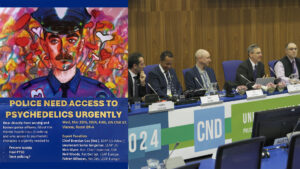Psychedelics, mental health, COVID-19, and our drug laws: The Silent Pandemic and the search for innovation in the treatment of mental health problems. Please read this article by Beatrix Vas – and watch the movie they produced about research on psychedelics!
It is a staggering fact that mental, neurological, and substance-use disorders are the silent pandemic of our generation. Data is incredibly patchy; due mainly to high levels of stigma, mental health disorders remain widely underreported, but it is estimated that more than 10% of the world’s population is affected by some kind of mental health problem – more than one in 10 people. According to data by the World Health Organization, mental illness makes up 30% of the non-fatal disease burden, and 10% of the overall disease burden worldwide. The World Bank estimates that global economic output losses due to mental, neurological, and substance-use disorders add up to somewhere between $2.5-8.5 trillion globally every year. These figures only begin to scrape the surface of the human, social, and economic consequences of the inadequate attention given to the treatment of mental health issues.
The WHO estimates that even in high-income countries, between 35% and 50% of people with severe mental disorders receive no treatment at all, and the availability and quality of mental health services is inadequate pretty much everywhere. At the same time, prescription drugs that help manage symptoms of mental illnesses are increasingly popular and are a lucrative business. However, some people respond better to these drugs than others, and for some people, existing treatments don’t work at all. Meanwhile, since the development of the family of antidepressant drugs called selective serotonin reuptake inhibitors (SSRIs) in the 1990s, no significant innovation has been made in the field and put into practice.
Cue the ‘psychedelic renaissance’, or the (re)discovery and reinvigoration of research into psychedelic-assisted psychotherapy. In recent years, after decades of prohibition due to the so-called War on Drugs, attention has again turned towards clinical research of the medical potential of psychedelic substances, including LSD, psilocybin, and MDMA. Today, the research shows great promise, and indicates that psychedelics, used as part of therapy in medically controlled environments, could be some of the most effective treatments for many common mental disorders. The research into MDMA as a treatment for otherwise treatment-resistant PTSD has been granted “breakthrough therapy designation” in the United States, fast-tracking Phase 3 clinical trials that could prepare the introduction of prescription use.
As we are currently in the middle of another pandemic – the outbreak of the novel coronavirus, COVID-19 – we need to be mindful of the psychological distress the situation has the potential to cause, besides the public health concern stemming from the virus itself. The crisis and its consequences have the potential to gravely affect our individual and collective mental health. The main infection mitigation strategies, like issuing stay-at-home orders and social distancing, are likely to have a profound effect, as it directly leads to depriving our brains of our core need for human connection. After the SARS outbreak in China in 2003, a spike in post-traumatic stress disorder (PTSD) cases was observable, and some studies already conducted with Chinese citizens during the COVID-19 outbreak showed a rise in post-traumatic stress symptoms. The WHO has also recognised mental health during this time as a major concern.
The COVID-19 outbreak has both hindered and given new ground to the global movement to decriminalise psychedelics and support clinical research. In the United States, which is battling one of the world’s worst coronavirus outbreaks, major advocacy campaigns have gained new momentum to get the decriminalisation of plant-based hallucinogens, such as psilocybin mushrooms, on state ballots at the upcoming elections in November, including in Oregon, Vermont, New York, and Washington D.C. – despite the difficulties of collecting signatures during the pandemic. Some U.S. cities, like Denver, Santa Cruz, and Oakland have already effectively decriminalised psilocybin and some other natural psychedelic substances, largely thanks to the continuous advocacy efforts of the Decriminalize Nature movement.

Decriminalisation of the plants and their psychedelic components can be considered a necessary step to pave the way for the establishment and acceptance of psychedelic-assisted therapies, partially because it could ease the process of clinical research and trials. While academics, non-profits, and startups in countries like the U.S. and the U.K. have made great strides, in most places it is still very difficult to get research projects involving psychoactive substances approved and funded. Because of the strict regulations, a clinical trial involving the use of these substances requires immensely extensive, difficult, and time-consuming administrative efforts and researchers assume great liability – and all the while obtaining the substances for research is made very expensive through limiting the approved suppliers. In later phases, when human trials become necessary, things get even more difficult and costly.
In light of this, while we often talk of a psychedelic renaissance, it can seem like results are coming in very slowly. Organisations of researchers and academics are continuously advocating for the loosening of regulations to support their work – the most notable successful example of such is perhaps the U.S. Food and Drug Administration coming to agreement with the Multidisciplinary Association for Psychedelic Studies (MAPS), and granting MDMA Breakthrough Therapy Designation for the treatment of posttraumatic stress disorder (PTSD) in 2017. Psilocybin research by the startup Compass Pathways was also given the same designation for the treatment of severe treatment-resistant depression in 2019. Such a designation is intended to essentially fast-track the development and review of new medications to address unmet medical needs.
Quite a few initiative groups and organisations in the psychedelic community have been drawing attention to the need to further fast-track research and medication approval processes, especially in light of the looming post-COVID global mental health crisis. Mind Medicine Australia, a charity supporting clinical research and working towards regulatory-approved psychedelic-assisted therapies, has started a campaign to raise awareness about the potential and likely mental health consequences of the COVID-19 pandemic, and to the unpreparedness of the health care system in the country. Their recommendations to the government include the evaluation and possible introduction of innovative treatment options like the use of psychedelic-assisted therapies.
In the U.K., the Medical Psychedelics Working Group was recently established by the non-profit organization Drug Science, pulling together academics, researchers, and policymakers to campaign for the rescheduling of psychedelics drugs to better allow research into their medical and therapeutic benefits. They have also called attention to the fact that while the U.K. is one of the leaders in clinical psychedelic research globally, serious barriers to research processes remain.
Psychedelics are not medical miracles per se, and building a robust clinical evidence-base for their use in medical and therapeutic settings is critical – just like with any other new medication or treatment method. However, the persisting stigma around substance use and restrictive government policies severely hinders medical innovation and perpetuates human suffering.
The picture is even more bleak in countries with more strict drug laws, like Hungary. The country was once at the forefront of psychedelic research – Hungarian chemist and psychiatrist Stephen Szara was the first to scientifically study the effects of DMT, the psychotropic element found in many plants, and a main component of ayahuasca. Today as well, many Hungarian scientists and researchers are making internationally significant contributions to the ‘psychedelic renaissance’ – but most of their work must be conducted outside of the country, and to not much recognition at home.
The film above showcases the wonderful contributions of Hungarian researchers in the fields of psychedelic science and medicine, and their commitment to working towards alleviating people’s suffering. It highlights the particular difficulties of conducting this research in Hungary, the challenges posed by stigmatising attitudes, and further obstacles to this process – and how we can move towards change.
Research and medical innovation, of course, knows no borders – in fact, in true psychedelic spirit, it is most effective as a community experience.
It is crucial at this time, for those at the forefront of the psychedelic medicine space to come together and collaborate, and it is crucial for researchers, activists, and journalists to raise awareness among the general public about the current state of science regarding these substances. Together, as Margaret Zhang of Osmind put it in a recent opinion piece: “[w]e can overcome our shared history of political and cultural stigmatization of psychedelic substances and accelerate progress in the field of psychedelic research, something that is needed more than ever in a post-COVID world.”
Article by Beatrix Vas
Film: Endre Kuklin and Beatrix Vas







